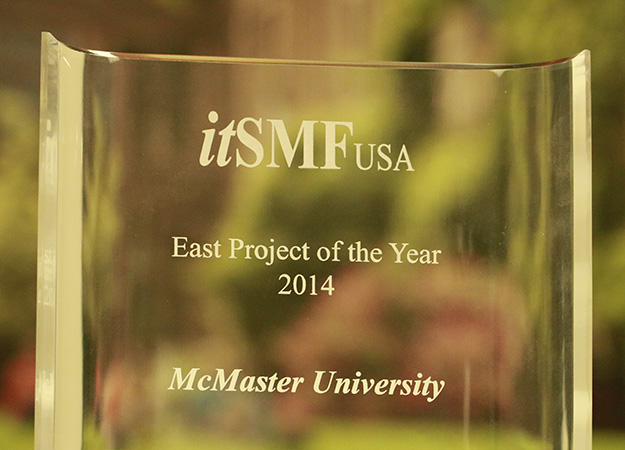UTS wins award for cultural service transformation

McMaster's UTS department recently earned the prestigious 'Regional Project of the Year (East Region)' award from itSMF USA. 'It’s really about growing the culture of UTS beyond our traditional technology expertise to include customer and client service skills,' explained John Kearney, McMaster’s chief information officer, who leads University Technology Services.
Three years ago, University Technology Services faced a hard truth: it had technical expertise and dedicated staff with good intentions, but many of its clients at the University didn’t feel that they were receiving the best customer service.
Today, the department is being recognized for the steps it has taken to transform itself into a service oriented, customer focused organization.
For successfully integrating IT service management principles into it is culture, UTS was recently awarded “Regional Project of the Year (East Region)” by itSMF USA, a U.S.-based, independent professional organization for IT Service Management professionals.
Of the three winners (East, West and Central regions), McMaster was the only Canadian institution recognized.
“UTS needed to augment its technical expertise with expertise in understanding the needs of our clients across the University,” said John Kearney, McMaster’s chief information officer, who leads UTS.
“We had staff who, individually, were trying to be customer centric but the department’s processes had been designed to solve technical problems rather than create solutions for clients.”
This realization started a multi-year journey for UTS that has transformed the department and earned it an award from itSMF USA.
As a first step, all UTS employees completed a week-long course and earned international certification in ITIL, which is a set of best practices for information technology service management that focuses on aligning IT services to the needs of the organization. This training taught UTS staff techniques for structuring their work as service, understanding client needs, and designing service focused business processes.
“It’s really about growing the culture of UTS beyond our traditional technology expertise to include customer and client service skills,” explained Kearney.
“Information technology has evolved to be more than keeping discrete systems running. It’s about helping our clients meet their objectives by using any number of IT systems or processes to add value to their operations.”
UTS staff immediately started a series of initiatives to use their new skills by developing processes for Incident Management, Service Level Management, Change Management and Service Catalogue Management. UTS is now using these processes in day-to-day operations. The new processes accommodate the complexity of maintaining McMaster’s legacy systems, the implementation and testing of the new enterprise resource planning system (i.e. Mosaic), and the development and delivery of new IT projects.
The adoption of ITIL service management by UTS fits into the University’s broader IT strategy, Vision 2020, which identified a renewed focus on service delivery as a priority for UTS.

